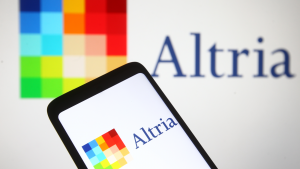The takeaway is that the Fed is less likely to lower interest rates, which puts pressure on equities. But while some stocks will struggle, others are built to shine during rising inflation. These are the companies that deliver the products and services that consumers need to have regardless of what’s happening in the economy.
A common trait of these companies is that they are mature companies with a consistent track record of generating positive revenue and earnings. When these companies’ stock outperforms the market, the companies can pass along that growth to shareholders.
PepsiCo (PEP)

Investors seem to have a lot of reasons to talk down PepsiCo’s (NASDAQ:PEP) stock. Until recently, the stock had been lagging behind the broader market due to concerns about declining volume. There was concern over weight-loss drugs eating into the company’s earnings.
But inflation is a great equalizer. While it’s true that Pepsi has missed on revenue in its last two quarters, earnings are still higher than estimates for the quarter and on a year-over-year basis.
That speaks to pricing power, which investors should be looking for right now. Consumers may be pulling back, but Pepsi products are still getting its share of the consumer wallet. And when you buy PEP stock, you’re buying a dividend king with a dividend yield of 2.85% and an annual payout of $4 per share.
Many investors could put Coca-Cola (NYSE:KO) instead of Pepsi. Both stocks are dividend kings that show no sign of putting their respective streaks in danger. However, PEP stock has outperformed KO stock over the last five years by about 43%.
Kenvue (KVUE)

Kenvue (NYSE:KVUE) is the consumer products spin-off from Johnson & Johnson (NYSE:JNJ). When looking at inflation-beating stocks, JNJ would be a solid choice, but Kenvue merits strong consideration.
The company inherited Johnson & Johnson’s popular consumer brands, including Tylenol, Listerine, and Band-Aid. Yes, Kenvue also has its parent company’s baby powder. Still, it carries none of the settlement costs from the lawsuit settlement after Johnson & Johnson indemnified Kenvue from any of the talc-related liabilities.
In its first three quarters of reporting as an independent company, Kenvue has posted solid but not spectacular results. However, with many investors having an appetite for tech stocks as opposed to consumer discretionary stocks, KVUE stock is down 11% in its first year since going public.
But stickier inflation allows the company to remind investors why it’s a viable safe-haven stock. And it’s association with Johnson & Johnson also grafts the company onto the list of dividend kings. And KVUE stock already has a yield of over 4%.
Kimberly-Clark (KMB)

Kimberly-Clark (NYSE:KMB) is next up on this list of stocks to buy if inflation continues. And no surprise, the company is another dividend king. The streak is 53 years, counting for Kimberly-Clark, and the dividend has an attractive yield of 3.56%.
Like many consumer products companies, the company has had its ups and downs since 2020, and so has KMB stock. This isn’t a high flyer by any means. The stock is up just over 9% in the last five years. But times of high inflation are a boon to defensive stocks. In the month ending April 24, 2024, KMB stock is up 9.2%, pushing the stock higher for the year.
Inflation is also suitable for income investors. Yes, the company is guilty of “shrinkflation,“ which has boosted its bottom line. As a consumer, you hate it. As an investor, you like what higher earnings means for the company’s future dividend growth.
CMS Energy (CMS)

Utilities are a good place to look for stocks to buy if inflation continues. And a quality stock to consider is CMS Energy (NYSE:CMS) or Consumers Energy. The company operates primarily as a regulated electric and gas utility in Michigan. The company also has a renewable energy business that just announced a partnership with Walmart (NYSE:WMT). Consumers Energy will provide clean energy to power 44 Walmart locations in Michigan.
The company has come to light on the top line in the last four quarters compared with analyst expectations. However, it’s made up for it on the bottom line where it has come in higher year-over-year in each quarter. In the company’s first quarter of 2024, the earnings report raised its guidance for the coming year.
Strong earnings are one reason that CMS stock is a favorite of Warren Buffett. The Oracle of Omaha owns company shares through his Berkshire-Hathaway (NSYE:BRK.B) hedge fund.
Altria Group (MO)

They may not be right for every portfolio, but sin stocks make great defensive stocks. Altria (NYSE:MO) is one of the world’s leading cigarette manufacturers, and the company has been increasingly moving into smokeless products (e.g., vapes). No matter your personal feelings about these products, there’s no denying that Altria has a significant market share that will only grow.
However, a more compelling reason to buy MO stock while inflation is still firmly entrenched is the company’s dividend, which currently has a 9% yield. Like many stocks on this list, Altria is a dividend king that has increased its dividend for 55 consecutive years.
After a rough 2023, investors may get the message on MO stock. The stock is up more than 7% as of April 25, 2024. And with the stock still down 5% in the last 12 months, there’s plenty of stock price appreciation to go along with that dividend.
Albertson’s (ACI)

If you don’t do the grocery shopping in your home, you may not appreciate what a savvy Albertson’s (NYSE:ACI) may be. With inflation exacting a stiff price on grocery bills, retail grocery chains have to give consumers a reason beyond price to visit their stores.
The company instituted a loyalty program that is showing strong YOY growth. It’s also making advancements in its digital marketing program including online ordering with both home delivery and curbside pickup options.
These programs have allowed Albertson’s to have a consistent top line. However, as is the case with many stocks on this list, the real story is robust bottom line growth. And while Albertson’s is not a dividend king, it does pay a respectable dividend with a yield of 2.41%.
ACI stock is down 13% in 2024, some of which is because the regulators still decide if they’ll allow the company’s proposed merger with Kroger (NYSE:KR). More will be known in August, but that would also be a catalyst for the stock.
Genuine Parts Company (GPC)

There are two solid cases for making Genuine Parts Company (NYSE:GPC) one of your stocks to buy if inflation continues. On its earnings call in April, the company acknowledged that it continues to be affected by inflation and higher interest rates.
But inflation cuts both ways. Many consumers are being priced out of newer vehicles. Or, in some cases, they find that dealers lack the models (i.e., traditional ICE vehicles) they may prefer.
This creates a situation where consumers try to keep their existing vehicles around for as long as possible. And the latest reading of the CPI showed that auto parts were one area where inflation was the stickiest.
The second reason is that Genuine Parts is yet another dividend king on this list. The company recently made it 69 consecutive years of increasing dividends. The yield of 2.51% is fairly average. However, the payout ratio of 44% easily supports future growth, particularly when analysts forecast high single-digit earnings growth in the next 12 months.
On the date of publication, Chris Markoch did not have (either directly or indirectly) any positions in the securities mentioned in this article. The opinions expressed in this article are those of the writer, subject to the InvestorPlace.com Publishing Guidelines.
Chris Markoch is a freelance financial copywriter who has been covering the market for over five years. He has been writing for InvestorPlace since 2019.
